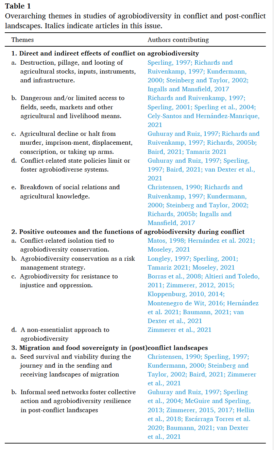- Two guides to making good presentations. For what it’s worth, here’s my take: fewer words.
- The latest on taro leaf blight in Samoa, from an Indigenous perspective. Not a presentation in sight.
- Agroforestry in the Solomon Islands involves 132 species. Probably including taro.
- The case for agroecology from the Global Alliance for the Future of Food. You could also see the above.
- Or, we could tweak photosynthesis.
Agricultural biodiversity and conflict
The papers that compose this issue evidence how an integrative approach is not only analytically beneficial but also necessary for research supporting the sustainable resolution of conflict, the related conservation of agrobiodiversity and equitable human-environment relations.
Gabriel Tamariz and Megan Baumann have co-organized and co-edited a special issue of Geoforum on “Agrobiodiversity Change in Conflict and Post-Conflict Landscapes.” I’m hoping I won’t get into trouble for sharing this table which gives an idea of what’s in it.
Brainfood: Genetic diversity, Pointy maize, Diversification, Hybrid yeast, African yam bean, Urbanization, Wild tomato ecogeography, Wild banana seeds, Seed systems, Phytosanitary, Rematriation, Cowpea development, ABS
- The crucial role of genome-wide genetic variation in conservation. Don’t fetishise functional variation.
- The Ancient Varieties of Mountain Maize: The Inheritance of the Pointed Character and Its Effect on the Natural Drying Process. Case in point?
- Diversification for enhanced food systems resilience. Do fetishise diversification.
- Restoring fertility in yeast hybrids: Breeding and quantitative genetics of beneficial traits. Well, that’s one way to diversify. Mules next?
- Predictive genotype-phenotype relations using genetic diversity in African yam bean (Sphenostylis stenocarpa (Hochst. ex. A. Rich) Harms). From 93 IITA accessions to a handful of good ones for the fetishes of seed and/or tuber yield.
- Genetic resources management, seed production constraints and trade performance of orphan crops in Southern Africa: A case of Cowpea. Could maybe fetishise cowpea a little more?
- Urbanization and agrobiodiversity: Leveraging a key nexus for sustainable development. What’s the opposite of fetishising? Demonising? Ok, don’t demonise urbanisation then. Gosh I hope I’m using these words correctly…
- Edaphoclimatic Descriptors of Wild Tomato Species (Solanum Sect. Lycopersicon) and Closely Related Species (Solanum Sect. Juglandifolia and Sect. Lycopersicoides) in South America. We may be in danger of fetishising ecogeography.
- Banana seed genetic resources for food security: Status, constraints, and future priorities. Half of banana wild relatives are not in genebanks at all. Not that we want to fetishise crop wild relatives, but that seems a lot.
- Regulating Seeds—A Challenging Task. How do we avoid fetishising neither formal nor informal seed systems?
- The phytosanitary risks posed by seeds for sowing trade networks. The case for robust phytosanitary measures in global forage seed trade networks. No need to fetishise them though.
- The value of agrobiodiversity: an analysis of consumers preference for tomatoes. Consumers fetishise heirloom tomatoes to the tune of an additional €0.90 per kilo.
- Dynamic guardianship of potato landraces by Andean communities and the genebank of the International Potato Center. Communities don’t fetishise rematriated landraces, but that doesn’t matter.
- Facing the Harsh Reality of Access and Benefit Sharing (ABS) Legislation. The dangers of fetishising ABS. Or is it demonising?
Nibbles: GenResBridge, Food for All, CIAT genebank, Seed for the Future, Vavilov book, Seeing Pastoralism, S Sudan floods, Sustainable diets, Elon Musk, CePaCT, NZ genebank, Wild potato, Peyote
- Europe gets a genetic resources strategy at last. Rejoice.
- Book on how international organizations could, should, would transform agriculture.
- Meanwhile, in Cali…
- BBVA and El Celler de Can Roca collaborate on forgotten foods documentary, Seeds for the Future.
- A novel about Vavilov? Well, why not.
- Exhibition on pastoralism.
- Visual essay on floods in South Sudan.
- Why not throw money at food security though? I mean, just see above, right?
- Beyond the EAT-Lancet diet. S. Sudan unavailable for comment.
- The SPC genebank curator waxes lyrical.
- Not far away, New Zealand cryopreserves some of its native plants.
- The latest on the Four Corners potato. I hope it’s in cryo…
- …and that it doesn’t go the way of the peyote.
Nibbles: Archaeobotany, Citrus genebank, Vitellaria, Potato genebank, Pignolo, IK, Atlas of Living Australia,
- Q&A with an archaeobotanist looking into the domestication history of maize and gourds.
- Q&A with the curators of the University of California, Riverside Citrus Variety Collection.
- Q&A on the shea tree genome.
- CIP’s potato cryobank. There’s probably a Q&A somewhere too.
- Snippets of a review of an interesting-sounding book about the almost-forgotten Pignolo grape.
- Snippets of the Indigenous ecological knowledge used by traditional agriculturalists in India.
- A more systematic approach to documenting and protecting Indigenous ecological knowledge from Australia.
